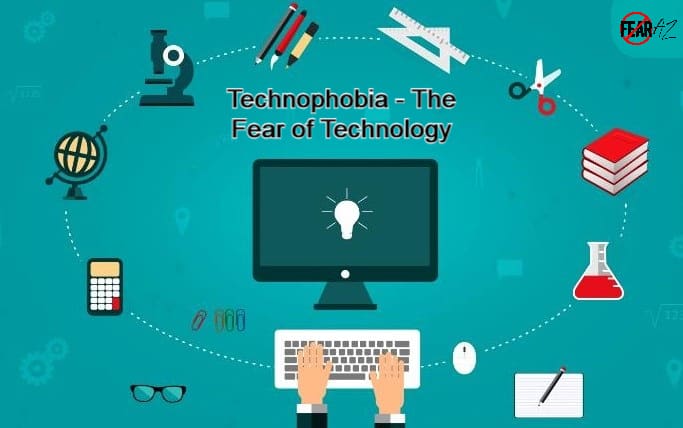Share This Article
Technophobia – The Excessive Fear of General Technology & A.I.
Do you ever find yourself feeling anxious or afraid when faced with advanced technology? Do you panic at the thought of using a smartphone or avoid using complicated remote controls? Are you worried that machines or technology, especially artificial intelligence (AI), might take over our lives? If your answer is yes, you might be experiencing technophobia—a fear of technology that can range from mild discomfort to severe anxiety.
The fear of AI plays a major role in technophobia. As AI systems become more common in our daily lives, from personal assistants like Siri and Alexa to advanced algorithms that predict how we behave online, it’s natural to feel nervous about these developments. Many people ask themselves, “Should we fear AI?” or wrestle with their fears about AI as the technology evolves. Movies and media often depict AI as a potential threat, reinforcing our fear-of-artificial-intelligence phobia. That’s why it’s important to understand technophobia, its causes, and ways to cope with it.

What Is Technophobia?
Technophobia refers to the excessive fear of advanced technology or complex gadgets. This fear is more common than many realize, especially as technology continuous to evolve. For those who struggle with technophobia, the fast pace of change can feel overwhelming. New devices, software updates, and digital platforms can leave technophobes feeling confused and anxious. This confusion often leads to greater fears—fears that something could go wrong in our daily lives or that they won’t be able to operate these technologies at all.
Those who experience technophobia often have anxiety related to many forms of technology, not just advanced gadgets or AI. They might feel fearful of computers, smartphones, social media, and even coding languages. Some technophobes worry they’ll lose personal connections because of the rise of digital communication. The shift away from face-to-face interactions may feel isolating for those who fear technology’s impact on human relationships.
Is Technophobia a Mental Illness?
Technophobia is not classified as a mental illness. It’s more accurately described as a specific phobia that causes discomfort or distress when dealing with technology. Unlike some phobias, technophobia doesn’t usually involve disgust toward technology itself, but rather feelings of fear or unease about the impact of technology on society as a whole.
What Can Cause Technophobia?
If you’re wondering why you might be afraid of technology, there are several common causes you might consider.
Fear of the Unknown
Fear is a natural human response to the unknown and one of the main causes of technophobia. Many of us feel safe with the familiar and stable aspects of our lives. When new technology is introduced, it can cause feelings of uncertainty and fear. If we’re used to having control in a situation, unfamiliar gadgets or systems can leave us feeling unsafe or vulnerable.
Doomsday Scenarios
The fear of misuse of technology also plays a crucial role in technophobia. News stories often highlight accidents and negative events involving technological failures. This can lead us to associate technology with disastrous outcomes. This fear may develop into beliefs that robots might lead to a dystopian future or that our personal privacy could be jeopardized through surveillance. Such fears about AI often contribute to a general anxiety surrounding technology.
Self-Doubt
Another major contributor to technophobia is the fear of being left out or excluded due to a lack of technological skills. If someone feels unskilled or behind in their understanding of new devices, their self-esteem may suffer. In an effort to escape embarrassment, they may avoid using new technology altogether.
Age Factors
While technophobia can be experienced by those of any age, there are some common age-related trends. Older individuals may fear not understanding new technology, while younger ones often worry that technology will take over their jobs, as it has in the past. Historically, workers have protested against machines because they feared loss of jobs. Such anxiety surrounding technology, including AI, continues to affect new generations.
Symptoms of Technophobia
Although symptoms of technophobia vary from person to person, there are common ones to look for. The fear becomes a phobia when an individual takes extreme measures to avoid technology or outright refuses to interact with it.
Common behaviors of technophobes may include:
- Refusal to learn or use new devices
- Constant criticism of new technologies
- Rationalizing an aversion to technology
- Feeling overwhelmed by complex instructions or operating requirements
In addition to behavioral symptoms, individuals with technophobia may also experience physical, mental, and emotional reactions:
Physical Symptoms
- Dizziness
- Breathlessness
- Increased heart rate
- Sweating
- Trembling
- Numbness or tingling sensations
Mental and Emotional Symptoms
- Fear of losing control
- Confused or “fuzzy” thoughts
- Social withdrawal
- Anxiety about being left out of technological conversations
- Anger toward technology or those who use it
- Fear of change
Many technophiles go to great lengths to avoid technology and often find themselves relying on others to navigate advanced devices, which can add to their feelings of inadequacy and anxiety.

Treatments for Technophobia
Individuals facing technophobia can take positive steps to manage their fear toward technology. While some may benefit from professional help, there are also many self-help strategies that can lead to significant improvements.
Self-Help Strategies for Technophobia
Acceptance
The first step in overcoming any phobia is to acknowledge its existence. Accept that your fear of technology is real but recognize that it is also irrational and treatable. Self-reflection on the reasons for your fear can help. Understanding that your anxiety is a common response to change will empower you to face it.
Physical Activity
Engaging in regular physical exercise can reduce feelings of anxiety. Activities like jogging, swimming, or even brisk walking can help release endorphins—chemicals in the brain that act as natural stress relievers. Including these activities in your routine can relieve some of the overall anxiety that feeds into technophobia.
Stress-Management Techniques
Techniques that focus on grounding and distraction can help manage anxiety. Practices like deep breathing, yoga, and meditation allow you to redirect your thoughts and calm your mind when faced with technology. It’s important to pace yourself and not feel pressured to keep up with technology’s rapid evolution. Taking small breaks and giving yourself time to adapt can make a big difference.
Education
Educating yourself about technology can remove some of the mystery. The more you learn about how various devices and software work, the less daunting they will seem. Start by exploring user-friendly guides or tutorials related to the technologies you fear the most. Understanding the basics can build your confidence and reduce your fear.
Gradual Exposure
Slowly exposing yourself to technology can help desensitize your fear. Start with devices or applications that seem less intimidating and gradually move on to more complex ones. For example, you could begin by spending a short amount of time navigating a simple app before progressing to something more complex. This gradual exposure can help you experiment with technology without feeling pressured.
Building a Support System
Surrounding yourself with supportive friends and family can help ease your anxieties about technology. Talking about your fears can lead to new insights and encouragement. Others can offer assistance or guidance whenever you face technological challenges, providing you with confidence and comfort.
Seeking Professional Help
If self-help strategies aren’t enough to curb technophobia, seeking professional assistance is a valid next step. Mental health professionals can provide various therapeutic approaches designed to meet your specific needs.
Cognitive Behavioral Therapy (CBT)
CBT can be particularly effective in treating phobias. This therapy teaches you how to confront your fears logically, challenge negative thoughts, and reframe them in a more rational light. Learning how to process and respond to fear can make it easier to engage with technology in a positive way.
Psychodynamic Therapy
Exploring underlying issues from your past that may contribute to your technophobia can be beneficial. A therapist can help you delve into childhood experiences or traumas that led to your fear of technology, fostering a better understanding of your phobias.
Exposure Therapy
This approach involves gradually exposing you to what you fear—in this case, technology—until the fear diminishes. The process is done under the guidance of a qualified therapist, who will provide support as you face your anxiety.
Additional Therapies
Other types of therapy that may help include talk therapy, dialectical behavior techniques (DBT), and mindfulness-based stress reduction. These methods can provide tools and techniques to manage anxiety more effectively and promote a more positive mindset toward technology.
In Conclusion
Navigating the world of technology can be challenging, especially for those wrestling with technophobia. As we move further into the digital age, understanding and use of technology will be important. However, fear of technology—especially technologies like artificial intelligence—can hold some back.
Technophobia can create barriers to personal growth, career advancement, and social engagement as technology becomes increasingly involved in our lives. Recognizing that you’re not alone in your fears is an important step. Countless resources and strategies are available to help you manage and overcome these anxieties. Though it may take time and effort, with the right mindset and support, you can lead a fulfilling life alongside technology.
Embracing Technology
Rather than allowing fear to dictate your relationship with technology, try to embrace the conveniences and benefits it offers. While it’s natural to have some apprehensions about new advancements—especially as AI continues to evolve—shifting how you think about it can lead to personal growth and enrichment. While asking ourselves, “Should we fear AI?” is valid, we must also explore how we can understand and live with this developing technology.



